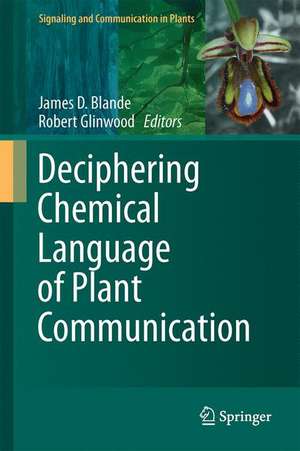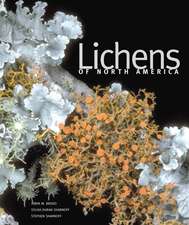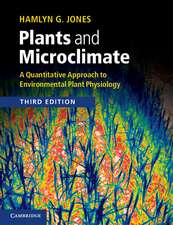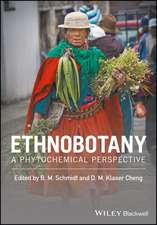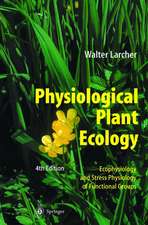Deciphering Chemical Language of Plant Communication: Signaling and Communication in Plants
Editat de James D. Blande, Robert Glinwooden Limba Engleză Hardback – 2 aug 2016
| Toate formatele și edițiile | Preț | Express |
|---|---|---|
| Paperback (1) | 1382.06 lei 6-8 săpt. | |
| Springer International Publishing – 30 mai 2018 | 1382.06 lei 6-8 săpt. | |
| Hardback (1) | 1388.05 lei 6-8 săpt. | |
| Springer International Publishing – 2 aug 2016 | 1388.05 lei 6-8 săpt. |
Din seria Signaling and Communication in Plants
- 15%
 Preț: 641.71 lei
Preț: 641.71 lei - 24%
 Preț: 793.47 lei
Preț: 793.47 lei - 24%
 Preț: 1208.95 lei
Preț: 1208.95 lei - 18%
 Preț: 1118.13 lei
Preț: 1118.13 lei - 24%
 Preț: 783.53 lei
Preț: 783.53 lei - 18%
 Preț: 1111.53 lei
Preț: 1111.53 lei - 18%
 Preț: 998.34 lei
Preț: 998.34 lei - 18%
 Preț: 1545.57 lei
Preț: 1545.57 lei - 18%
 Preț: 1547.81 lei
Preț: 1547.81 lei - 18%
 Preț: 951.29 lei
Preț: 951.29 lei - 24%
 Preț: 796.83 lei
Preț: 796.83 lei - 18%
 Preț: 942.63 lei
Preț: 942.63 lei - 18%
 Preț: 1219.77 lei
Preț: 1219.77 lei - 18%
 Preț: 954.31 lei
Preț: 954.31 lei - 18%
 Preț: 953.20 lei
Preț: 953.20 lei - 18%
 Preț: 956.50 lei
Preț: 956.50 lei - 18%
 Preț: 942.63 lei
Preț: 942.63 lei - 18%
 Preț: 943.73 lei
Preț: 943.73 lei - 24%
 Preț: 1053.39 lei
Preț: 1053.39 lei - 18%
 Preț: 941.48 lei
Preț: 941.48 lei - 18%
 Preț: 943.57 lei
Preț: 943.57 lei - 18%
 Preț: 943.43 lei
Preț: 943.43 lei - 18%
 Preț: 944.51 lei
Preț: 944.51 lei - 18%
 Preț: 945.30 lei
Preț: 945.30 lei - 18%
 Preț: 1221.07 lei
Preț: 1221.07 lei - 18%
 Preț: 944.19 lei
Preț: 944.19 lei - 18%
 Preț: 948.92 lei
Preț: 948.92 lei
Preț: 1388.05 lei
Preț vechi: 1692.75 lei
-18% Nou
Puncte Express: 2082
Preț estimativ în valută:
265.60€ • 278.05$ • 219.77£
265.60€ • 278.05$ • 219.77£
Carte tipărită la comandă
Livrare economică 07-21 aprilie
Preluare comenzi: 021 569.72.76
Specificații
ISBN-13: 9783319334967
ISBN-10: 3319334964
Pagini: 412
Ilustrații: VIII, 326 p. 29 illus., 22 illus. in color.
Dimensiuni: 155 x 235 x 19 mm
Greutate: 0.64 kg
Ediția:1st ed. 2016
Editura: Springer International Publishing
Colecția Springer
Seria Signaling and Communication in Plants
Locul publicării:Cham, Switzerland
ISBN-10: 3319334964
Pagini: 412
Ilustrații: VIII, 326 p. 29 illus., 22 illus. in color.
Dimensiuni: 155 x 235 x 19 mm
Greutate: 0.64 kg
Ediția:1st ed. 2016
Editura: Springer International Publishing
Colecția Springer
Seria Signaling and Communication in Plants
Locul publicării:Cham, Switzerland
Cuprins
Section 1: Plant Volatiles – complexity of chemicalmessages.- 1. Temporal dynamics ofplant volatiles: mechanistic bases and functional consequences.- 2. Environmental impactson plant volatile emission.- 3. Impacts of inductionof plant volatiles by individual and multiple stressors across multiple trophiclevels.- 4. Measuring rapidchanges in plant volatiles at different spatial levels.- Section 2: Ecology ofvolatile mediated communication processes.- 5. Who’s listening totalking plants?.- 6. Ecological role of odourdiversity.- 7. Neighbour recognitionthrough volatile-mediated interactions.- 8. Calling in the dark:The role of volatiles for communication in the rhizosphere.- 9. Complexity of plantvolatile-mediated interactions beyond the third trophic level.- 10. On the air:Broadcasting and reception of volatile messages in brood-site pollinationmutualisms.- 11. Multifunctional anddiverse floral scents mediate biotic interactions embedded in communities.- Section 3: Mechanismsof volatile detection by plants.- 12. Plantelectrophysiology – early stages of the plant response to chemical signals.- 13. Uptake and conversionof volatile compounds in plant-plant communication.- Section 4 : Synthesis and futuredirections.- 14. Synthesis and futuredirections for deciphering plant chemical language.
Textul de pe ultima copertă
This book provides an overviewof the intricacies of plant communication via volatile chemicals. Plantsproduce an extraordinarily vast array of chemicals, which provide communitymembers with detailed information about the producer’s identity, physiology andphenology. Volatile organic chemicals, either as individual compounds or complexchemical blends, are a communication medium operating between plants and anyorganism able to detect the compounds and respond. The ecological andevolutionary origins of particular interactions between plants and the greatercommunity have been, and will continue to be, strenuously debated. However, itis clear that chemicals, and particularly volatile chemicals, constitute amedium akin to a linguistic tool. As well as possessing a rich chemicalvocabulary, plants are known to detect and respond to chemical cues. These cues can originate from neighbouring plants, or other associatedcommunity members. This book begins with chapters on the complexity of chemicalmessages, provides a broad perspective on a range of ecological interactionsmediated by volatile chemicals, and extends to cutting edge developments on thedetection of chemicals by plants.
Caracteristici
Complete overview on plant volatiles Highlights methods for analysing plant language Gives future directions for deciphering plant chemical Includes supplementary material: sn.pub/extras
